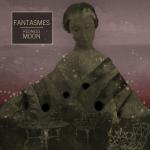
Fantasmes Redness Moon
(Last Bummer)
Puerto Rico. If the salsa of Héctor Lavoe and the reggaeton of Daddy Yankee are your conceptions of its musical prowess, then you're excluding the thousands of rock records, rock musicians, and guitar shops across the island – about the size of Connecticut – that have infected and infiltrated a culture already used to stealing, plundering, and copying other cultures, blending and roasting influences together in an unique Caribbean amalgam. It's a musical culture, a symbolic culture, a celebrating culture, where a guitar isn't a phallic symbol, but rather, a connecting symbol: a fence surrounding the sheep, the horses, the houses; the waves, the winds and the oceans surrounding the island itself. Many, though poor economically, have access to (sometimes cheap) musical equipment, and that's enough to sketch dreams, exchange philosophies, share stories, graph rooms, houses, buildings, constellations. I've seen these people, I've heard them play, I've collected their vibes and gone to my grandfather's house to sleep in the heat with the coquí-machine ear-drumming in me along with a vein-rush of the day's memories of how goddamn different Puerto Ricans play music. The side of the road is not a stage; the trees are not a PA system, and when you are used to communicating musically without payment, entitlement, and a college degree, you play for pure sensation, pure alteration, pure vision to the vortexes that offer us the endorphin-access to what we seek in every moment: pure passion.
Psych rock – especially the Puerto Rican kind – bifurcates the task of the rock musician in this post-modern age of digital reproduction, questioning if the 60s acidhead psychology can function for iPhone cyborgs (and all the other species) who log in and out of themselves, always in and out of themselves and back into RealTime, like me, listening to a digital promo of the San Juan duo Fantasmes' newest record, Redness Moon, in the falling out heat of summer in New York City. My fan's blowing into my face, drying my lips. While used to listening to electronic music, I sometimes let a rock record slip into rotation; reviewing a rock band from PR is a Halley's Comet-like opportunity. And also an enjoyable one. The opening chords of the first track, called Cloud Propositions couldn't be more breezy, softening me down into its river-made guitar-lull, pulsed by two hands holding two drum sticks arriving on the moment exact and steadfast in their timing. Am I in the late 60s?, I ask. Is my name Jerry? Am I wearing jodhpurs, walking through a wheat-field towards a garage, where Mario Negrón and Darío Morales, the duo who are Fantasmes, await my arrival? Yonder I can hear the silky sexiness of Play It Wrong bass-thumping the voles out of their slumber, angering the grasshoppers, making them hop away in the other direction – and then I'm back into RealTime again. A guitar – either electric or acoustic – a male voice, a bass, a drum kit: these are the same timbres that have altered airwaves for a couple centuries, used in the beginning as a revelation into what rock could achieve (a boot squashing The Beatles as if they were beetles), establishing its comfortable borders, its aesthetic, its chemical components. Though they are Puerto Rican, the formula of psychedelic music is universal. What makes Redness Moon special is its details: the timbres and riffs that spellbind us in their unbelievability, the choices the band made in spacing out their sounds so that we can space out too.
Redness Moon sequences the shoe-touching-pedal ambience of the beach and the surf and the waves, with the urban, psychogeographic journeys into the bowels of the underside of a city – any city will do, an 18th century one, spelt with cobblestones and the noise of horse-drawn carriages, or perhaps a metacity with flying cars and Jedi knights. The lyrics, whisper-sung in obscure English (as if formed by the mouth of a glassblower) offer us half-finished perceptions of a neo-Lorca, adjusted to the effects technology has on nature and human emotion. Notice that they are sung in English, not Spanish. Bells and tambourines collide with perambulating sine waves on the final track, the mammoth, ten-minute Tell Me/Nothing Is Wrong, where for a few minutes a murk is formed out of huddled, shivering white noise, before dispersing with the hot fire of an oaky, acoustic guitar, crescendoing before the fade-out of the last shake of the maracas.
There's balance here. Fantasmes aren't simply interested in a riff-after-riff record, documenting how fast fingers can fly on a fretboard, or simply glueing themselves onto the adjective of psych, only to squirm around helplessly afterwards: there's a feeling that the atmosphere of the songs – and what that atmosphere makes us remember and visualize and pattern – is important because of its potent effects of dislocating us, inserting ourselves into another timeline, and restarting. Because of that, I've never thought of a psych rock album as filmic as Redness Moon. The associations of a song as a film scene are as dead as a dead phrase (as dead as a doornail), but that's not exactly what's happening, thankfully. The songs don't add up into an acid trip, despite the DNA heritage. They do something I like a lot more in music: they flicker with the vibrating life of actors caught on film, in a mise-en-scène with the reality that behind sound-alteration (behind film-making) there is its own artificiality – the artificiality of unnatural echoes, of undersea whale-songs written into hertz signals, of humans capturing sound and light into frames. But in that artificiality, there is another reality, dense with its new symbols that overflow us with nourishment and newness and aliveness, such as when listening to Redness Moon, and the hours in your universe afterwards.
6 September, 2012 - 09:44 — Michael Iovino